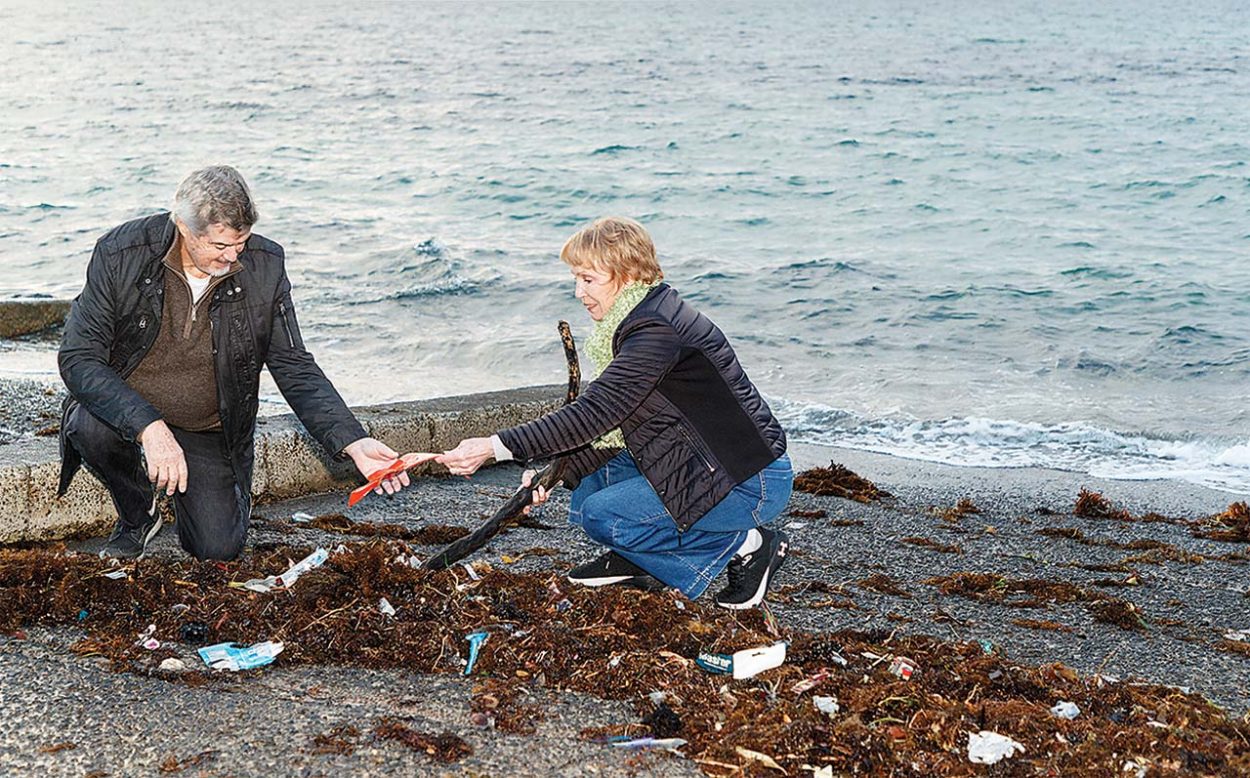RESIDENTS are voicing concern over increasing amounts of litter washing up on Mornington beaches, believed to be drifting in from other parts of Port Phillip Bay during high tides. Much of the debris has reportedly washed up at Fishermans Beach, Mothers Beach, and Mills Beach in recent weeks, which is understood to be a reoccurring issue in winter months when there is a combination of stormwater runoff and high tides that push rubbish across the bay.
Residents Chris and Lorraine, who asked not to share their surname, described the sight as “heartbreaking” after finding piles of litter at the Fishermans Beach boat ramp, as well as on the shoreline and entangled in seaweed last week. Among the rubbish was plastic bags, freezer lock bags, lolly wrappers, disposable green bags, plastic cups and more.
“If there was anything imaginable in plastic it was there… we saw seagulls and they were virtually picking up and throwing plastics around,” they said. “We are locals of eight years now and have never seen this level of pollution in one tidal change. People don’t seem to care what they’re doing with the disposal of their rubbish which is disappointing.”
Another resident and hand beach cleaning volunteer Melanie Bird said she and others found the same sort of litter at Mothers Beach next to the Mornington Yacht Club last week, which converged at the boat-launching ramp. “Another interesting item was a parking ticket from March 2025 issued in Moonee Valley – a common indicator of the way litter moves around the bay in a circular motion if it is not effectively removed in the first instance,” she said.
Mornington Peninsula Shire deputy mayor and Tanti Ward councillor Paul Pingiaro said he was aware of the increased litter on beaches, which was a result of high tides and circular currents in winter that redistributes rubbish from other parts of the bay. “With that comes a lot of industrial waste, whether it be those tiny little pieces of plastics; you’ve got syringes, you’ve got styrofoam, you’ve got all sorts of things and quite often parking tickets from City of Melbourne, City of Yarra – they all wash up. They all become unfortunately our problem and a bulk problem,” he told The News. He said syringes had also washed up at Mills Beach recently with the shire sending crews to use metal detectors to ensure they were all collected safely and disposed of.
“Our teams have been doing as good as they can,” he said. But he noted, “it’s a fair ask for people to pick up those individual pieces” when “one machine is equivalent to 40 people, and we can then go through and pick up those entangled messes because it’s not just syringes that wash up, it’s not just the plastics, it’s not just the rubbish there; it’s nylons, it’s fishing lines”.
A hand-beach cleaning trial along Port Phillip Bay has been in place since last July but is expected to end soon, after which a mechanical rake will be reinstated – a decision made by Mornington Peninsula Shire councillors in May. Raking would cover about 80 per cent of the beaches, while hand-cleaning would continue at beaches unreachable by machine.
Award winning beach cleaning campaigner Josie Jones OAM said the recent pollution events on the peninsula “have nothing to do with us” since hand cleaning was in use. “We broke the cycle here, however it [litter] is coming from mechanically raked beaches around the bay, because when the high tides rise during winter months it pulls the litter from the sand and begins to redistribute,” she said. “I have been doing reconnaissance observations at Port Melbourne, Mentone and Parkdale which are all raked beaches that show high levels of plastic sitting in the sand and also high levels of plastic sitting in the intertidal zone.
“It is really important to make people aware that our beaches are in fact clean now thanks to the hand cleaning however due to the maladaptive practice of mechanical beach raking, we are stuck in a path of dependency where we will continuously see litter like this washing up on our shores during the winter months.”
Jones undertook a “Litter and Plastics” assessment report which has been published in the State of the Marine and Coastal Environment 2024 report, which is set to be tabled at Parliament. Her report presents findings about mechanical raking, concluding hand cleaning is more effective at eliminating negative ecological impacts of heavy equipment on fragile ecosystems.
Port Phillip Conservation Council Inc. secretary Jenny Warfe said threats to the bay were “only getting worse” as population growth meant more rubbish. “We’re also getting higher high tides as sea levels rise, so it’s to be expected that we see impacts on our shoreline and beyond,” she said. “As sea levels rise and climate change kicks in; changes to rainfall patterns, stronger coastal winds, higher temps affecting coastal vegetation, etc, we’ll see more damage to the beach, shoreline and beyond with more damage to the dune system backing the beach, and in some areas protecting major infrastructure such as Point Nepean Rd, nearby houses etc.
“Rather than ill-informed whingeing about some natural material on the beach, now is the time to be gentle with our coastline – leave the shoreline alone, allow natural material to stay where it has been for thousands of years doing an essential job for us at no cost, and protecting the shoreline from erosion and feeding the species we share our environment with. “All the while, the scientific studies have shown that the mechanical raking is leaving rubbish behind often breaking it into smaller pieces that birds, fish and other animals mistakenly eat whilst foraging.”
First published in the Mornington News – 22 July 2025




